动词被动语态
- 格式:doc
- 大小:66.00 KB
- 文档页数:4
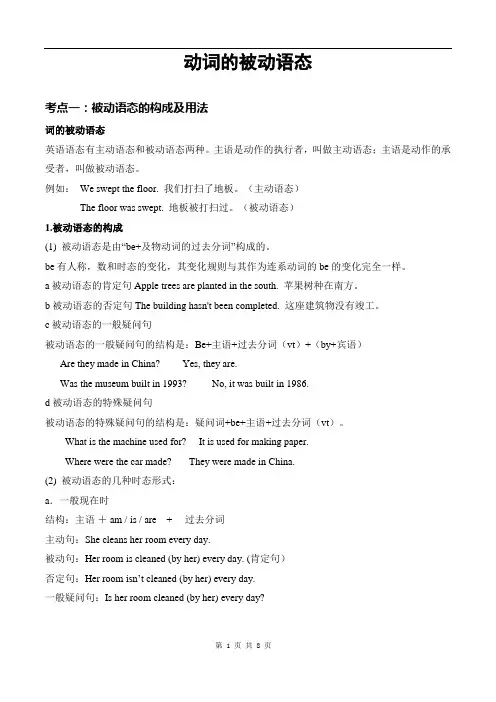
动词的被动语态考点一:被动语态的构成及用法词的被动语态英语语态有主动语态和被动语态两种。
主语是动作的执行者,叫做主动语态;主语是动作的承受者,叫做被动语态。
例如: We swept the floor. 我们打扫了地板。
(主动语态)The floor was swept. 地板被打扫过。
(被动语态)1.被动语态的构成(1) 被动语态是由“be+及物动词的过去分词”构成的。
be有人称,数和时态的变化,其变化规则与其作为连系动词的be的变化完全一样。
a被动语态的肯定句 Apple trees are planted in the south. 苹果树种在南方。
b被动语态的否定句 The building hasn't been completed. 这座建筑物没有竣工。
c被动语态的一般疑问句被动语态的一般疑问句的结构是:Be+主语+过去分词(vt)+(by+宾语)Are they made in China? Yes, they are.Was the museum built in 1993? No, it was built in 1986.d 被动语态的特殊疑问句被动语态的特殊疑问句的结构是:疑问词+be+主语+过去分词(vt)。
What is the machine used for? It is used for making paper.Where were the car made? They were made in China.(2) 被动语态的几种时态形式:a.一般现在时结构:主语+ am / is / are + 过去分词主动句:She cleans her room every day.被动句:Her room is cleaned (by her) every day. (肯定句)否定句:Her room isn’t cleaned (by her) every day.一般疑问句:Is her room cleaned (by her) every day?注意:被动句的be助动词的变化应按被动句中新主语的人称和数而变化,其时态应与主动句的时态一致.b.一般过去时结构:主语+was / were +过去分词主动句:The workers made the VCD last week.被动句:The VCD was made by the workers last week.(肯定句)否定句: The VCD wasn’t made by the workers last week.一般疑问句:Was the VCD made by the workers last week?c. 一般将来时结构:主语+will be + 过去分词主动句:My father will send me to America soon.肯定句:I will be sent to America by my father soon.否定句:I won’t be sent to America by my father soon.一般疑问句:Will you be sent to America by your father soon?d. 过去将来时结构:主语+would be + 过去分词主动句:He said he would punish the naughty boy tonight.肯定句:He said the naughty boy would be punished by him tonight.否定句:He said the naughty boy wouldn’t be punished by him tonight.e. 现在进行时结构:主语+ am / is / are + being + 过去分词主动句:He is telling a story now.肯定句:A story is being told by him now.否定句:A story isn’t being told by him now.一般疑问句:Is a story being told by him now?f. 过去进行时结构:主语+was / were + being + 过去分词主动句:He was telling a story when I came in.肯定句:A story was being told by him when I came in.否定句:A story wasn’t being told by him when I came in.一般疑问句:Was a story being told by him when I came in?g. 现在完成时结构:主语+have / has +been + 过去分词主动句: The boy has finished the work.肯定句: The work has been finished by the boy.否定句: The work hasn’t been finished by the boy.一般疑问句: Has the work been finished by the boy?h. 过去完成时结构:主语 + had + been + 过去分词主动句: They had built ten buildings by 2003.肯定句: Ten buildings had been built by them by 2003.否定句: Ten buildings hadn’t been built by them by 2003.一般疑问句: Had ten buildings been built by them by 2003?i. 含有情态动词结构:主语+can/may/must+be+过去分词主动句: I can find it.肯定句: It can be found by me.否定句: It can’t be found by me.一般疑问句: Can it be found by me?2.被动语态的用法(1) 不知道动作的执行者是谁。
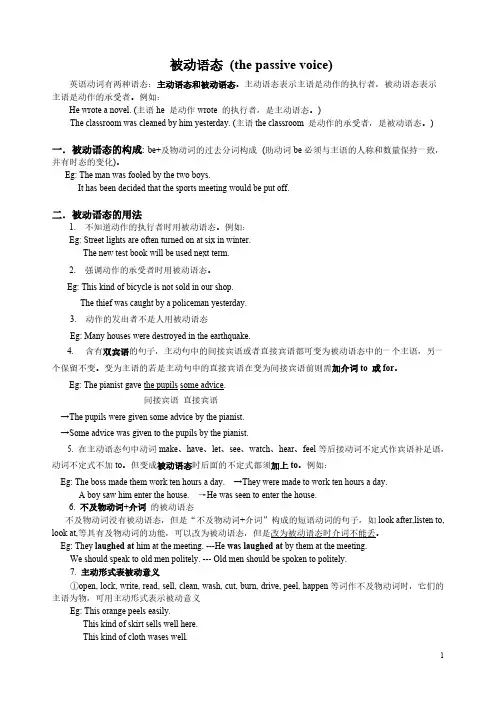
被动语态(the passive voice)英语动词有两种语态:主动语态和被动语态。
主动语态表示主语是动作的执行者,被动语态表示主语是动作的承受者。
例如:He wrote a novel. (主语he 是动作wrote 的执行者,是主动语态。
)The classroom was cleaned by him yesterday. (主语the classroom 是动作的承受者,是被动语态。
)一.被动语态的构成: be+及物动词的过去分词构成(助动词be必须与主语的人称和数量保持一致,并有时态的变化)。
Eg: The man was fooled by the two boys.It has been decided that the sports meeting would be put off.二.被动语态的用法1. 不知道动作的执行者时用被动语态。
例如:Eg: Street lights are often turned on at six in winter.The new test book will be used next term.2. 强调动作的承受者时用被动语态。
Eg: This kind of bicycle is not sold in our shop.The thief was caught by a policeman yesterday.3.动作的发出者不是人用被动语态Eg: Many houses were destroyed in the earthquake.4. 含有双宾语的句子,主动句中的间接宾语或者直接宾语都可变为被动语态中的一个主语,另一个保留不变。
变为主语的若是主动句中的直接宾语在变为间接宾语前则需加介词to 或for。
Eg: The pianist gave the pupils some advice.间接宾语直接宾语→The pupils were given some advice by the pianist.→Some advice was given to the pupils by the pianist.5. 在主动语态句中动词make、have、let、see、watch、hear、feel等后接动词不定式作宾语补足语,动词不定式不加to。
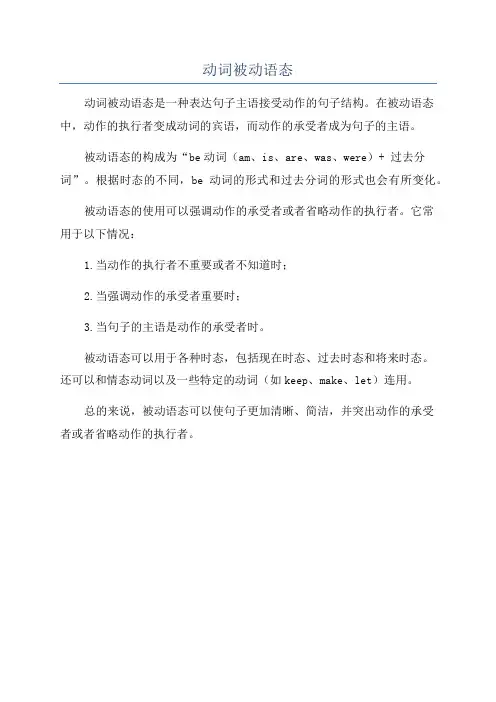
动词被动语态
动词被动语态是一种表达句子主语接受动作的句子结构。
在被动语态中,动作的执行者变成动词的宾语,而动作的承受者成为句子的主语。
被动语态的构成为“be动词(am、is、are、was、were)+ 过去分词”。
根据时态的不同,be动词的形式和过去分词的形式也会有所变化。
被动语态的使用可以强调动作的承受者或者省略动作的执行者。
它常
用于以下情况:
1.当动作的执行者不重要或者不知道时;
2.当强调动作的承受者重要时;
3.当句子的主语是动作的承受者时。
被动语态可以用于各种时态,包括现在时态、过去时态和将来时态。
还可以和情态动词以及一些特定的动词(如keep、make、let)连用。
总的来说,被动语态可以使句子更加清晰、简洁,并突出动作的承受
者或者省略动作的执行者。

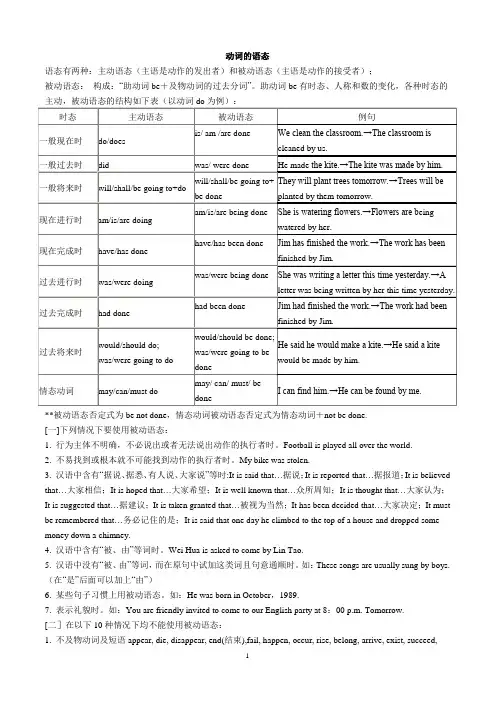
动词的语态语态有两种:主动语态(主语是动作的发出者)和被动语态(主语是动作的接受者);被动语态:构成:“助动词be+及物动词的过去分词”。
助动词be有时态、人称和数的变化,各种时态的主动,被动语态的结构如下表(以动词do为例):时态主动语态被动语态例句一般现在时do/does is/ am /are done We clean the classroom.→The classroom iscleaned by us.一般过去时did was/ were done He made the kite.→The kite was made by him.一般将来时will/shall/be going to+do will/shall/be going to+be doneThey will plant trees tomorrow.→Trees will beplanted by them tomorrow.现在进行时am/is/are doing am/is/are being done She is watering flowers.→Flowers are b eingwatered by her.现在完成时have/has done have/has been done Jim has finished the work.→The work has beenfinished by Jim.过去进行时was/were doing was/were being done She was writing a letter this time yesterday.→Aletter was being written by her this time yesterday.过去完成时had done had been done Jim had finished the work.→The work had beenfinished by Jim.过去将来时would/should do;was/were going to dowould/should be done;was/were going to bedoneHe said he would make a kite.→He said a kitewould be made by him.情态动词may/can/must do may/ can/ must/ bedoneI can find him.→He can be found by me.**被动语态否定式为be not done,情态动词被动语态否定式为情态动词+not be done.[一]下列情况下要使用被动语态:1. 行为主体不明确,不必说出或者无法说出动作的执行者时。
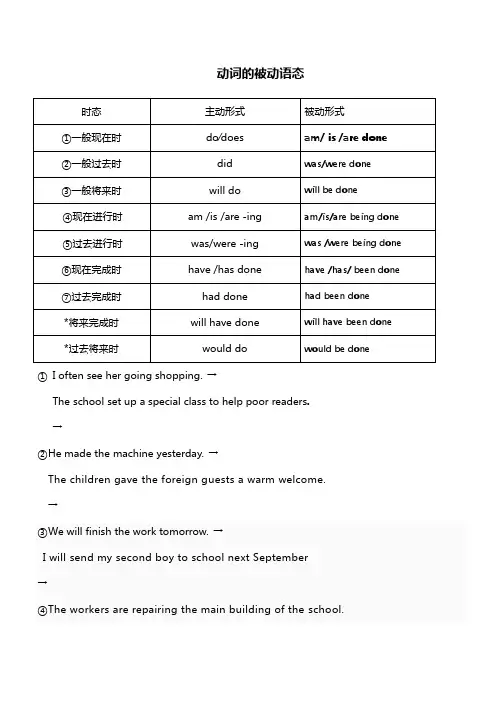
动词的被动语态①I often see her going shopping.→The school set up a special class to help poor readers.→②He made the machine yesterday.→The children gave the foreign guests a warm welcome.→③We will finish the work tomorrow.→I will send my second boy to school next September→④The workers are repairing the main building of the school.→They are disscussing the question in the room→⑤I was washing dishes at that time.→⑥We have finished the work.→Many countries have sent up satellites into space.→⑦We had cancelled the meeting before he arrived.→He had cleaned the room before I came back.→⑧We will have learned 1000 words by next term.→⑨He said that they would build the bridge next year→▲含情态动词的被动结构:情态动词+be+doneWe can repair this watch in two days.→We should do the work as soon as possible.→You must pay attention to your pronunciation→1) 被动语态的一般疑问句是将一个Be动词置于主语之前;( Does Kate sometimes break glasses? → The glasses are sometimes broken by Kate.→Are the glasses sometimes broken by kate? )Do you always send a letter to Mr Hu?→Did he clean the blackboard just now?→2)否定句是在第一个助动词后加not;He doesn't show the stamps to me.→He didn't give the dictionary to me yesterday.→●Nobody can answer this question. →The question can be answered by nobody. ()The question can not be answered by anybody. ( ) Nobody can throw the rubbish everywhere.→●They haven't done anything to make the river clean.→Anything hasn't been done to make the river clean. ()Nothing has been done to make the river clean. ()He didn’t bring anything to me .→3)特殊疑问句的语序为:疑问词+一般疑问句。
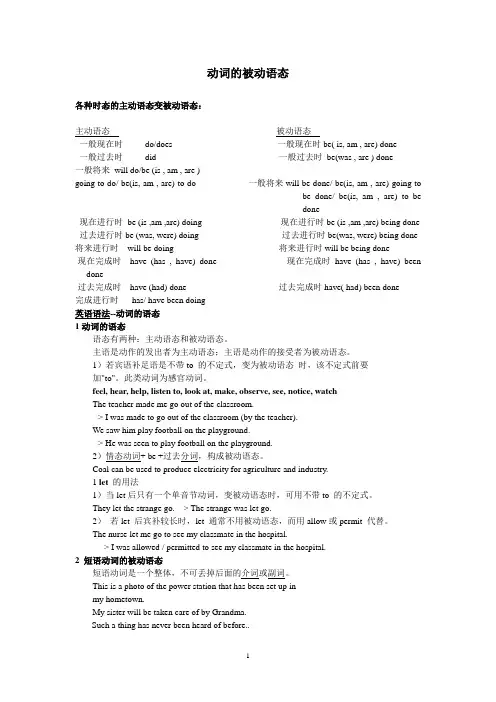
动词的被动语态各种时态的主动语态变被动语态:主动语态被动语态一般现在时do/does 一般现在时be( is, am , are) done一般过去时did 一般过去时be(was , are ) done一般将来will do/be (is , am , are )going to do/ be(is, am , are) to do 一般将来will be done/ be(is, am , are) going tobe done/ be(is, am , are) to bedone现在进行时be (is ,am ,are) doing 现在进行时be (is ,am ,are) being done 过去进行时be (was, were) doing 过去进行时be(was, were) being done 将来进行时will be doing 将来进行时will be being done现在完成时have (has , have) done 现在完成时have (has , have) been done过去完成时have (had) done 过去完成时have( had) been done完成进行时has/ have been doing英语语法--动词的语态1动词的语态语态有两种:主动语态和被动语态。
主语是动作的发出者为主动语态;主语是动作的接受者为被动语态。
1)若宾语补足语是不带to 的不定式,变为被动语态时,该不定式前要加"to"。
此类动词为感官动词。
feel, hear, help, listen to, look at, make, observe, see, notice, watchThe teacher made me go out of the classroom.--> I was made to go out of the classroom (by the teacher).We saw him play football on the playground.--> He was seen to play football on the playground.2)情态动词+ be +过去分词,构成被动语态。
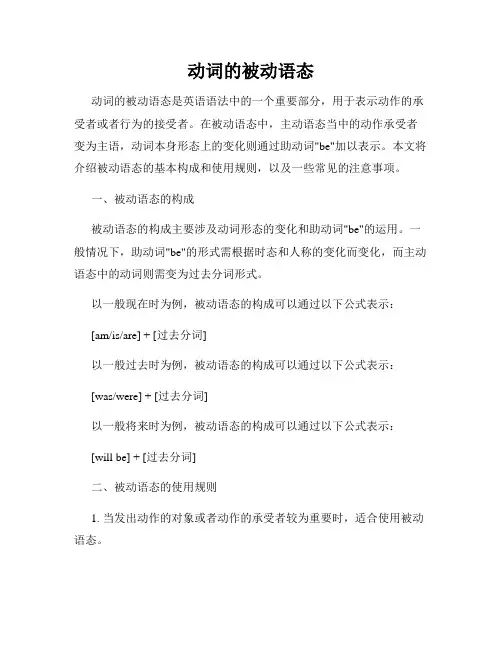
动词的被动语态动词的被动语态是英语语法中的一个重要部分,用于表示动作的承受者或者行为的接受者。
在被动语态中,主动语态当中的动作承受者变为主语,动词本身形态上的变化则通过助动词"be"加以表示。
本文将介绍被动语态的基本构成和使用规则,以及一些常见的注意事项。
一、被动语态的构成被动语态的构成主要涉及动词形态的变化和助动词"be"的运用。
一般情况下,助动词"be"的形式需根据时态和人称的变化而变化,而主动语态中的动词则需变为过去分词形式。
以一般现在时为例,被动语态的构成可以通过以下公式表示:[am/is/are] + [过去分词]以一般过去时为例,被动语态的构成可以通过以下公式表示:[was/were] + [过去分词]以一般将来时为例,被动语态的构成可以通过以下公式表示:[will be] + [过去分词]二、被动语态的使用规则1. 当发出动作的对象或者动作的承受者较为重要时,适合使用被动语态。
例句:The cake was made by my grandmother.(这个蛋糕是我奶奶做的。
)2. 当强调动作的行为者不重要或未知时,适合使用被动语态。
例句:The car was stolen last night.(这辆车昨晚被偷了。
)3. 当句子的主语是不能产生动作的物体时,适合使用被动语态。
例句:The window was broken by the strong wind.(这扇窗户被大风打破了。
)4. 当句子的主语是人的时候,可以使用被动语态,但需注意时态和语态的一致性。
例句:The book will be read by all the students.(这本书将由所有学生阅读。
)三、被动语态的注意事项1. 被动语态中的动词通常不需要与被动的行为者进行逻辑上的一致。
例句:The letter was sent by him.(这封信是他寄出的。
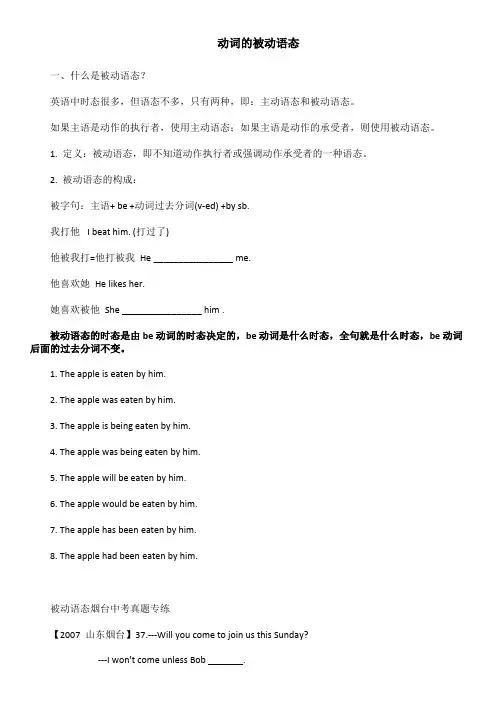
动词的被动语态一、什么是被动语态?英语中时态很多,但语态不多,只有两种,即:主动语态和被动语态。
如果主语是动作的执行者,使用主动语态;如果主语是动作的承受者,则使用被动语态。
1. 定义:被动语态,即不知道动作执行者或强调动作承受者的一种语态。
2. 被动语态的构成:被字句:主语+ be +动词过去分词(v-ed) +by sb.我打他I beat him. (打过了)他被我打=他打被我He ________________ me.他喜欢她He likes her.她喜欢被他She ________________ him .被动语态的时态是由be动词的时态决定的,be动词是什么时态,全句就是什么时态,be动词后面的过去分词不变。
1. The apple is eaten by him.2. The apple was eaten by him.3. The apple is being eaten by him.4. The apple was being eaten by him.5. The apple will be eaten by him.6. The apple would be eaten by him.7. The apple has been eaten by him.8. The apple had been eaten by him.被动语态烟台中考真题专练【2007 山东烟台】37.---Will you come to join us this Sunday?---I won't come unless Bob _______.A.is invitedB.will be invitedC. can inviteD. invites【2008 山东烟台】30.Old people must ________ .A.be spoken to politelyB.speak to politeC.be spoken politelyD.speak polite【2008 山东烟台】38.---What's wrong with your uncle ,Jack ?---He is ill . A doctor ______.A. has to look forB.is being operated onC.must ask forD.has been sent for【2011 山东烟台】27. It is true that knowledge_____ rather than being taught.A. learnsB. learnedC. is learnedD. was learned【2014 山东烟台】23. - How long may I your dictionary?- For one week. But it mustn't to others.A.keep, be lent B. borrow, lend C. lend, be borrowed D. have, borrow【2015山东烟台】30. Everyone in our class ___________ to take part in the English Speech Contest.A. is encouragedB. encouragesC. are encouragingD. are encouraged初中英语被动语态专项练习( ) 1. The People's Republic of China ___ on October 1, 1949.A. foundB. was foundedC. is foundedD. was found( ) 2. English ____ in Canada.A. speaksB. are spokenC. is speakingD. is spoken( )3. This English song___ by the girls after class.A. often singsB. often sangC. is often sangD. is often sung( ) 4. This kind of car ___ in Japan.A, makes B. made C. is making D. is made( ) 5. New computers ___ all over the world.A. is usedB. are usingC. are usedD. have used( ) 6. Our room must ___ clean.A. keepB. be keptC. to be keptD. to keep( ) 7 .-I'd like to buy that coat.-I'm sorry. ___.A. it soldB. it's sellingC. It's been soldD. it had been sold( )8.A new house ______ at the corner of the road.A. is buildingB. is being builtC. been builtD. be building( ) 9. The key _____ on the table when I leave.A. was leftB. will be leftC. is leftD. has been left( ) 10. Doctors _______ in every part of the world.A. needB. are needingC. are neededD. will need( )11. His new book______ next month.A. will be publishedB. is publishingC. is being publishedD. has been published ( ) 12. Japanese ______ in every country.A. is not spokenB. are spokenC. is speakingD. is not speaking() 13. These papers______yet.A. have not writtenB. have not been writtenC. has not writtenD. has not been written( ) 14. The sports meet ______ be held until next week.A. didn'tB. won'tC. isn'tD. doesn't( ) 15.---My shoes are worn out.-___________A. Can't they be mended?B. Let me have a look at it.C. How much do they cost?D. Can't they mended?Keys:答案:AADCAA1---5 BDDDC6-10 BCBBC11---15AABBA。
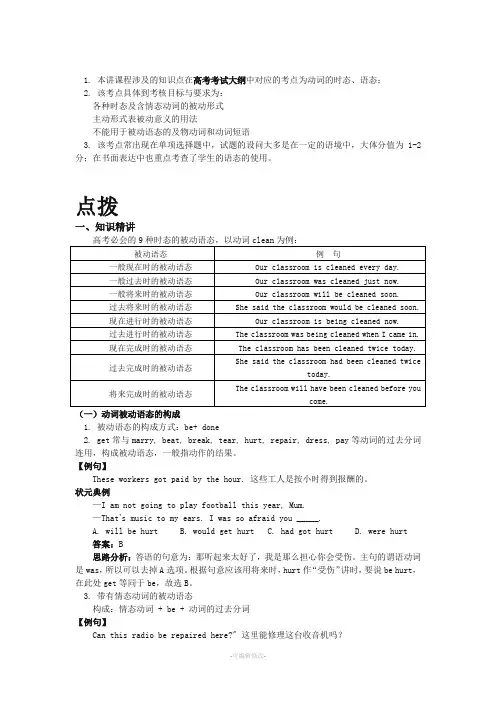
1. 本讲课程涉及的知识点在高考考试大纲中对应的考点为动词的时态、语态;2. 该考点具体到考核目标与要求为:各种时态及含情态动词的被动形式主动形式表被动意义的用法不能用于被动语态的及物动词和动词短语3. 该考点常出现在单项选择题中,试题的设问大多是在一定的语境中,大体分值为1-2分;在书面表达中也重点考查了学生的语态的使用。
点拨一、知识精讲(一)动词被动语态的构成1. 被动语态的构成方式:be+ done2. get常与marry, beat, break, tear, hurt, repair, dress, pay等动词的过去分词连用,构成被动语态,一般指动作的结果。
【例句】These workers got paid by the hour. 这些工人是按小时得到报酬的。
状元典例—I am not going to play football this year, Mum.—That’s music to my ears. I was so afraid you _____.A. will be hurtB. would get hurtC. had got hurtD. were hurt答案:B思路分析:答语的句意为:那听起来太好了,我是那么担心你会受伤。
主句的谓语动词是was,所以可以去掉A选项。
根据句意应该用将来时,hurt作“受伤”讲时,要说be hurt,在此处get等同于be,故选B。
3. 带有情态动词的被动语态构成:情态动词 + be + 动词的过去分词【例句】Can this radio be repaired here?" 这里能修理这台收音机吗?Your composition must be handed in tomorrow. 你的作文明天必须交。
状元典例The best use _______ our present machine.A. must be made ofB. must be madeC. must make ofD. must make答案:A思路分析:句意为:一定要充分利用我们目前(拥有)的机器。
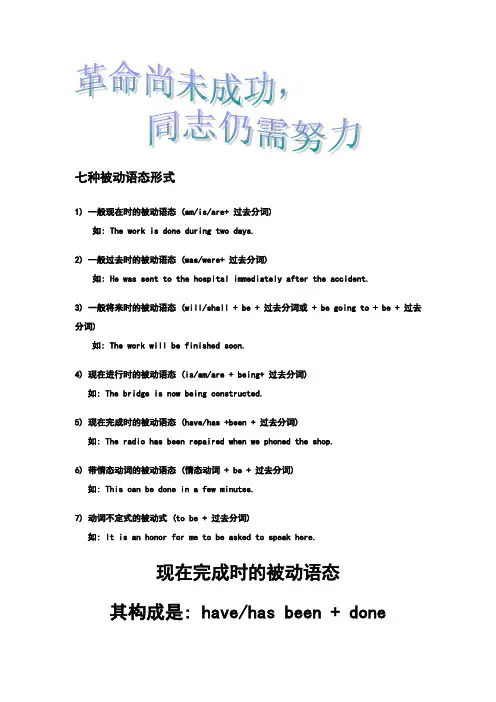
七种被动语态形式1) 一般现在时的被动语态 (am/is/are+ 过去分词)如: The work is done during two days.2) 一般过去时的被动语态 (was/were+ 过去分词)如: He was sent to the hospital immediately after the accident.3) 一般将来时的被动语态 (will/shall + be + 过去分词或 + be going to + be + 过去分词)如: The work will be finished soon.4) 现在进行时的被动语态 (is/am/are + being+ 过去分词)如: The bridge is now being constructed.5) 现在完成时的被动语态 (have/has +been + 过去分词)如: The radio has been repaired when we phoned the shop.6) 带情态动词的被动语态 (情态动词 + be + 过去分词)如: This can be done in a few minutes.7) 动词不定式的被动式 (to be + 过去分词)如: It is an honor for me to be asked to speak here.现在完成时的被动语态其构成是: have/has been + done现在完成时的被动语态表示动作发生在过去, 到现在已经完成或对现在仍有影响,。
如:1. The dirty clothes have been washed.脏衣服都已经洗了。
2. The plan has been studied by the experts for three times.这项计划已经由专家研究过三次了。
现在完成时:表示从过去持续到现在,还可能继续持续下去的动作,往往和表示一段时间的状语(for+一段时间, since…, )等连用,或用于how long 句型中1. 主语是行为动作的承受者。
动词的语态:主动语态和被动语态被动语态的基本结构:Be + done(过去分词)1、一般现在时:(主动语态)I help you.发出者动词承受者变为被动语态:Do——am/is/are doneYou are helped by me.承受者谓语发出者2、一般过去时的被动:did——was/were done(I helped you.-每个例子可让学生自己先尝试变被动,再给答案)3、一般将来时的被动:Will do——will be done(I will help you.-)4、现在进行时的被动:Am/is/are doing ——Am/is/are being done(I am helping you.-)5、过去进行时的被动:Was/were doing——Was/were being done(I was helping you.-)6、现在完成时的被动:Have done——have been done (I have helped you.-)7、过去完成时的被动:Had done——had been done (I had helped you.-)8、过去将来时的被动:Would do ——would be done (I would help you.-)答案:2、You were helped by me.3、You will be helped by me.4、You are being helped by me.5、You were being helped by me.6、You have been helped by me.7、You had been helped by me.8、You would be helped by me.。
动词的被动语态一、知识体系被动语态:语态是动词的一种形式,它表示主语和谓语的关系。
语态有两种:主动语态和被动语态。
如果主语是动作的执行者,或者是说动作是由主语完成的,要用主动语态;如果主语是动作的承受者,或者是说动作不是由主语而是由其他人完成的,则用被动语态。
基本结构:be+动词的过去分词各种时态,句型的主动被动语态结构表二、考点归纳(一)近五年天津中考试题共涉及10道相关题目单选题7道(9.3%),完成句子1道(4%),综合填空2道(4%)一般现在时:0541 0884 0941一般过去时:0733 0683 0770 0839一般将来时:0736情态动词:0540 0787(二)考查重点1、动词各种时态的被动语态形式以及主动形式表示被动意义的结构。
2、被动语态的结构和表达的意义。
3、被动语态的一些特殊运用形式。
(三)考查难点1、情态动词的被动语态结构。
2、主动表被动含义。
3、主动语态与被动语态的区别与联系。
(四)相关考点1、情态动词must的被动语态。
2、被动语态的各种时态对比。
3、被动语态的使用情境。
三、知识清单(一)适合被动语态的情况a.不知道谁是动作的执行者,或由于某种原因没有必要指出谁是动作的执行者时。
例如:This jacket is made of cotton. The book was written for children. 真题再现:0540.The flowers________ every day. Or they’ll die.A must waterB can be wateredC should waterD must be watered 0541.We are often told______ at people in trouble.A not to smileB to smileC not to laughD to laughb.需要突出或强调动作的承受者,例如:Food is needed by every living thing. 真题再现:0683. A short time ago,a test w(83)given in the United States. was0787. Computers can be u (87) for much more than word processing used (二)主动语态和被动语态的转换1)主动语态改被动语态的方法a)将主动语态改为被动语态应注意以下三个方面:①将主动语态的宾语改为被动语态的主语;②将主动语态的谓语动词改为“be+过去分词”结构;③将主动语态的主语改为介词by之后的宾语,放在谓语动词之后(有时可省略)。
动词的被动语态结构:1. be +done一般现在时am/is/are +done 一般过去时was/were +done一般将来时will +be +done 现在完成时have/has +been +done现在进行时am/is/are + being + done 情态动词+ be +及物动词的过去分词注意点:1.只有及物动词有被动语态, 不及物动词happen, take place, appear, disappear, break down和连系动词look, feel, smell, sound, get, turn等不能构成被动语态.2.变为被动语态,不能丢掉尾巴上的介词,常用的有look after, take care of, cut down, laugh at, talk about, turn on等eg. He always takes care of the little girl. →The little girl is always taken care of by him.3.有些动词短语有固定接法,接人时不用再加by,常用的有:be covered with; be surprised at; be interested in; be worried about; be made of/from; be known to4.某些动词形式是主动语态,但含有被动的意思.eg. This dictionary sells well. This kind of car drives fast.The woolen sweater costs $ 88.That car needs repairing.= That car needs to be repaired.5. 主动语态中有些动词如:make, see, listen, watch, feel后常跟不带to的动词不定式作宾语补足语,变为被动语态要带上to. 如:He made the boy work for him.→The boy was made to work for him.6.主动语态中若有双宾语(give sb. sth.; show sb. sth; pass sb. sth等),变为被动语态时注意:His uncle gave him a dictionary yesterday. →He was given a dictionary by his uncle yesterday. →A dictionary was given to him by his uncle yesterday练习题:一、把下列句子变为被动句:1.They asked me to come a little later. →I _________ _________ ________ come a little later.2.Women often talk about food and clothes. →Food and clothes _________ often __________ ________ by women.3.Do they make this kind of truck in Nanjing? → _________this kind of truck _________ in Nanjing?4.We must clean o ur teeth twice a day. →Our teeth must _________ _________ twice a day.5.Can I answer this question in simple English? →_________this question ________ ________ in simple English?6They have planted 400 trees so far. → 400 trees _______ _______ ________ by _______ so far.7.We don’t use brooms for sweeping the floor. → Brooms_________ _________for sweeping the floor.8. They made us wait at the gate. → We _______ _______ _______ _______ at the gate.9. Y ou must not put the bike there. → The bike ________ _______ _________there.10. Y ou should speak to the old politely. → The old ________ ________ _________ ________ politely.11. Where did you take these photos? → Where _______ these photos ________ ?12. Who wrote the novels? → _________ ________ the novels _________ __________?13. Y ou shouldn’t dig a hole here. → A hole ________ ________ _______ here.14. Must we hand in the homework right now? → _______ our homework _________ ________ _______ right now?15. Did he give us any magazines? → ________ we _________ any magazines _______ ________?→ _________ any magazines _________ _________ _________ by him?二、动词填空。
动词的被动语态一。
被动语态构成be+done一般现在时am/is/are+done一般过去时was/were +done一般将来时will/shall/be going to +be done完成时have/has/had been done进行时be being done不及物动词不用被动语态:happen, take place, occur, break out正确理解各种常见时态的被动语态被动语态表示主语是动作的承受着.例如The old doctor is respected by everyone.被动语态谓语动词be+及物动词的过去分词.被动语态共有十种时态. 以动词tell为例,其被动语态的各种时态构成如下:下面以往届高考题中出现的被动语态为例说明其具体用法.一般现在时(MET1993.30)答案: B. 在世界上一些地区,茶里放有牛奶和糖一起(被)供应.一般过去时:答案: C从句中”This ia Ted’s photo. We miss him a lot.”可知Ted 已经死了,因此”kill”应为过去的动作,而且是被动语态.现在进行时: (2001春招, 17)答案: D. 从后面的提示看,这项工程还没有完工,故应正在建设中,而且是被动语态,故答案为D.一般将来时:(2001春招,15)Hundreds of jobs________if the factory closes.A. loseB.are lostC.will be lostD.will lose答案: C此题中包含一个if引导的条件状语从句,从句用现在时代替将来时,因此主句应用一般将来时,而且句意为被动, 故答案为C.二.不同句型的被动语态1.双宾语的被动语态eg. I give my brother a computer.Sb间接宾语sth直接宾语A: My brother is given a computer by me.B: A computer is given to my brother.2.复合宾语的被动语态eg.We call him Lao Li.= He is called Lao Li by us.She told me to wait for you.=I was told to wait for you by her.3.感官动词和使役动词(let/make/have)的被动语态1).The boss made his workers work 15 hours each day.The workers were made to work 15 hours each day(bu the boss).2).I saw a child cross the road alone.A child was seen to cross the road alone.4.情态动词的被动语态情态动词+be + done1). We can turn solids into liquids.Solids can be turned into liquids.2).You must not leave the bike here.The bike must not be left here.5.动词短语的被动语态必须注意动词短语的完整性eg. They take a good care of the children.The children are taken a good care of.A good care is taken of the children.类似的短语还有:pay attention to, make use of etc.三。
被动语态(the passive voice)英语动词有两种语态:主动语态和被动语态。
主动语态表示主语是动作的执行者,被动语态表示主语是动作的承受者。
例如:He wrote a novel. (主语he 是动作wrote 的执行者,是主动语态。
)The classroom was cleaned by him yesterday. (主语the classroom 是动作的承受者,是被动语态。
)一.被动语态的构成: be+及物动词的过去分词构成(助动词be必须与主语的人称和数量保持一致,并有时态的变化)。
Eg: The man was fooled by the two boys.It has been decided that the sports meeting would be put off.二.被动语态的用法1. 不知道动作的执行者时用被动语态。
例如:Eg: Street lights are often turned on at six in winter.The new test book will be used next term.2. 强调动作的承受者时用被动语态。
Eg: This kind of bicycle is not sold in our shop.The thief was caught by a policeman yesterday.3.动作的发出者不是人用被动语态Eg: Many houses were destroyed in the earthquake.4. 含有双宾语的句子,主动句中的间接宾语或者直接宾语都可变为被动语态中的一个主语,另一个保留不变。
变为主语的若是主动句中的直接宾语在变为间接宾语前则需加介词to 或for。
Eg: The pianist gave the pupils some advice.间接宾语直接宾语→The pupils were given some advice by the pianist.→Some advice was given to the pupils by the pianist.5. 在主动语态句中动词make、have、let、see、watch、hear、feel等后接动词不定式作宾语补足语,动词不定式不加to。
但变成被动语态时后面的不定式都须加上to。
例如:Eg: The boss made them work ten hours a day. →They were made to work ten hours a day.A boy saw him enter the house. →He was seen to enter the house.6. 不及物动词+介词的被动语态不及物动词没有被动语态,但是“不及物动词+介词”构成的短语动词的句子,如look after,listen to, look at,等具有及物动词的功能,可以改为被动语态,但是改为被动语态时介词不能丢。
Eg: They laughed at him at the meeting. ---He was laughed at by them at the meeting.We should speak to old men politely. --- Old men should be spoken to politely.7. 主动形式表被动意义①open, lock, write, read, sell, clean, wash, cut, burn, drive, peel, happen等词作不及物动词时,它们的主语为物,可用主动形式表示被动意义Eg: This orange peels easily.This kind of skirt sells well here.This kind of cloth wases well.The car drives well.②look, sound, taste, smell, feel等系动词用主动形式表被动意义Eg: Uniforms look ugly on us.Mooncakes taste delicious.③在want, need, require等动词表示“需要”,后常可跟v.-ing形式表示被动,相当于to be doneEg: My bike needs repairing. = My bike needs to be repaired.Your hair wants cutting.④当break out, take place, shut off, turn off, work out 等动词表示“发生,关闭,制定”等意思表主动Eg: The plan worked out successfully.An earthquake took place in Y ushu on April 14th.四.复习时需要注意的要点(1)由主动语态改为被动语态的步骤:①主动语态中的宾语变为被动语态句中的主语;②主动语态句中的动词改为相应的被动语态;③主动语态句中的主语变为被动语态句中by的宾语。
(2)主动语态句中的谓语动词带有双宾语,即直接宾语和间接宾语时,转换方法有两种:①把间接宾语转化为主语,保留直接宾语②把直接宾语转化为主语,保留间接宾语。
此时,一般需在间接宾语前加适当的介词。
(3)在短语see sb. do sth. 中,动词see后跟不带to的不定式作宾补。
改为被动语态时要加上to。
用于这一结构的谓语动词一般是表示知觉的动词如see, hear等,以及使役动词make, let等。
Exercises for the passive voiceI. Change the following sentences into passive voice1.We often use a recorder in our English class.2.They will show a new film next week.3.When did they build the house?4.I saw the boy enter the room.5.Will they show a new film next week?6.Have they posted the letter yet?7.We often see him help his classmate.8.You must turn off the light before you go to bed.9.Who is repairing the bike?10.The student should learn all the texts by heart.11. Students must hand in their homework on time every day.12. Our headmaster always tell us an interesting story before the class.13. The teacher made Tom stand outside the classroom again.14. You can hear my mother singing Beijing Opera in the next room now.Ⅱ.Multiple choice:1. The reading room ________ yesterday afternoon.A. cleanedB. is cleanedC. was cleaningD. was cleaned2. The workers were made ________ ten hours a day.A. workB. to workC. workingD. worked3. Food ________ in a cool place in summer.A. must keepB. mustn’t keepC. must be keptD. mustn’t be kept4. One or two man-made satellites ______ in our country every year.A. have been sent upB. will be sent upC. is sent upD. are sent up5. The pen ________ well.A. writesB. is writtenC. was writtenD. writing6. Great changes ________ in the town since 1988.A. have taken placeB. have been taken placeC. has taken placeD. has been taken place7. Our compositions must ________ next Monday.A. be hand inB. be handed inC. handed inD. be handing in8. The child will ________ back to his parents next month.A. sentB. sendC. be sentD. be sending9. ________ his work ________ yet?A. have…been finishedB. has …been finishedC. has …finishedD. have…finished10. ---Have you moved into the new house?---No, not yet. The rooms _____.A. are being paintedB. are paintingC. are paintedD. are being painting11. How _____ the Great Pyramid _______ many years ago without modern machines.A. is…builtB. would…be builtC. have…been builtD. was…built12. Mr Li , you _____ on the phone.A. are wantedB. were wantedC. are being wantedD. will be wanted13. Kate has a high fever. A doctor must _____ at once.A. send forB. is sent forC. be sentD. be sent for14. The river smells terrible. People must _____ dirty things into it.A. be stopped to throwB. be stopped from throwingC. stop to throwD. stop from throwing15. ---Do you like the flower?---Yes, it _____ sweet.A. is smellingB. smeltC. is smeltD. smellsⅢ.Fill in the blanks with the proper forms of the given words.1. Now there is a shortage of water in the westsouthern areas of China, but a lot of water ______________(waste) every year. It’s a serious problem.2. With the help of science and technology, now many kinds of work ____________ (can do) by robots,including some dangerous and difficult ones.3. As we can see, English ____________ (speak) as the mother tongue or a second language in somedeveloped countries. So we must learn it well.4. Fish may not _____ _________ (catch) in the river now because of the serious pollution5. A new bridge ______________ (build) over the river last year. But it ________________(destroy) by abig fire last month.6. “I’m afraid it ______________ (need) mending”, Mrs. White turned off the TV.7. Vegetables, eggs and fish _______________ (sell) in most of the big supermarkets the whole day, sopeople needn’t go to the morning markets any more.8. The children __________ often ___________ (tell) to be careful with fire.9. The accident ______________ (happen) just now. It ______________(cause) by an illegal over-taking.10. Now he _____________ (be) asked if the meeting _____________ (hold) next Friday.。